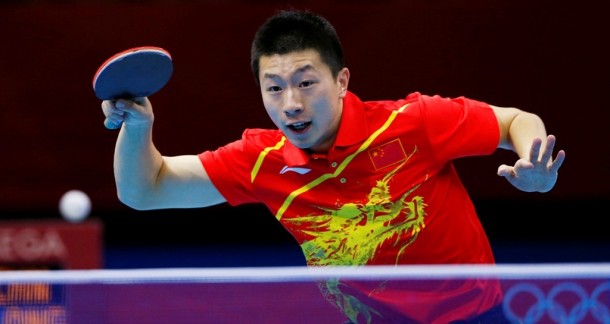LONDON—China is on the verge of doing just what’s expected by 1.3 billion people back home—sweeping all four Olympic gold medals in table tennis, the national pastime.
China’s men struggled for the first time in the Olympics, but defeated Germany 3-1 in the team event on Monday to reach the final. China’s women easily beat South Korea 3-0 to make the gold-medal match as the Asian power prepares to add to its tally of two golds and two silvers already won in singles.
China’s women face Japan in Tuesday’s final, and China plays South Korea in Wednesday’s men’s final.
This time it wasn’t so easy, particularly for the Chinese men.
“I was very nervous during the match,” China men’s coach Liu Guoliang said.
It doesn’t sound like much, but the admission by Liu—who seldom reveals much to non-Chinese media—tells how close China came to getting upset by Germany, widely regarded as the No. 1 threat to China’s dominance in the men’s game.
“We had our small chances,” German coach Jorg Rosskopf said.
The team event consists of a best-of-five match series.
In the first match, Germany’s Dimitrij Ovtcharov, the bronze medalist in London, pushed Ma Long relentlessly before losing. But Timo Boll, Germany’s top-ranked player, came back and defeated gold medalist Zhang Jike to level at 1-1 going into doubles.
Ovtcharov said “it would have been very different” had he won the first match.
“If we could have led 2-0, we would have had a chance.”
Boll and Bastian Steger led the doubles briefly—for about 20 minutes Chinese fans were silent—before Zhang and Wang Hao rallied to give China a 2-1 lead. China rolled through the next singles, taking the series 3-1.
“I was nervous, but not especially nervous,” said Zhang, who looked down and sent messages on his phone while taking questions. “This is normal for any human. We all get nervous.”
South Korea defeated Hong Kong in 3-1 in Monday’s other men’s semifinal. The victory avoided what would have been an all-China final. Hong Kong’s three players were all born in mainland China and moved to Hong Kong when they could not make China’s national team.
Hong Kong plays Germany for the bronze medal.
Tuesday’s women’s final pits Japan, which has never won an Olympic medal in table tennis, against China, which has won 22 of 26 gold medals since pingpong was added to the Olympics in 1988. The total is expected to become 24 of 28, with China favored in both team finals.
The Japanese women pose the first real threat to China’s women, who are led by gold medalist Li Xiaoxia, silver medalist Ding Ning, and Guo Yue, who forms the top doubles pair in the world with Li.
“I feel like the match (with Japan) is going to be a nervous match,” Li said. “Every match can be difficult and we prepare for the worst.”
The pressure seems to be off the Chinese women, who are more talkative since finishing singles, which eventually pitted Li against Ding for gold.
“In the singles, you have more pressure than the team events,” Ding said. “In singles, that pressure builds up on you. With three on a team, you can trust your teammates so there is less pressure.”
Japan’s women upset Singapore 3-0 on Sunday, beating a group composed of all China-born players. The same three took the silver medal four years ago in Beijing.
Singapore will face South Korea for the bronze.
Japan’s approach will be the same. A medal is already guaranteed, which will be a first in a sport that has deep roots in Japan.
“We had nothing to lose, so we just went for it,” said Sayaka Hirano, who teams with Ai Fukuhara and Kasumi Ishikawa.

















